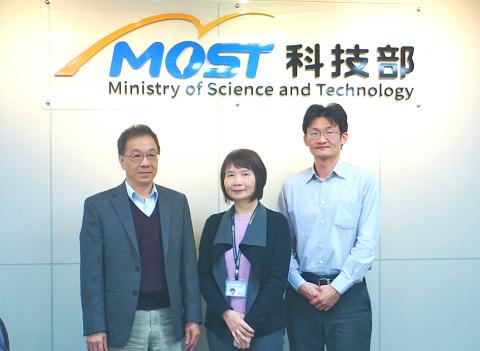Although the number of people in Taiwan who identify as Taiwanese has fallen since its peak of 75.15 percent in 2015, it has remained steady at 60 to 70 percent, the Ministry of Science and Technology yesterday told a news conference announcing the results of its Social Change Survey, which has been conducted for more than three decades.
In 1995, 32.13 percent of people in Taiwan identified as Taiwanese, Academia Sinica Institute of Sociology research fellow Lin Thung-hong (林宗弘) said.
It has since skyrocketed 43 percentage points and in 2015 topped 75 percent, he said.

Photo: Chien Hui-ju, Taipei Times
Although the theme of the survey varies from year to year, questions on important topics such as national identity are almost always included, he said.
The questionnaire asked participants whether they identified as “Taiwanese, “both Taiwanese and Chinese,” “both Chinese and Taiwanese” or “Chinese,” Lin said.
In 1992, when the question was first included, more than half of respondents said they have a dual national identity, but by 2015, the proportion had fallen to about 23 percent, he said.
For this year’s questionnaire, the researchers included questions about emerging technologies and the risks they pose, including views toward artificial intelligence, online information security, fake news and nuclear energy, he said.
The findings could also be applied to policymaking, researchers said.
For example, in 2017, 48.39 percent of men who earned less than NT$30,000 per month were unmarried — the highest ever, Lin said.
This year, the government raised the minimum monthly wage to NT$23,100, he said, adding that if employment conditions for young workers continue to improve, the marriage and fertility rates would rise.
The survey was begun by the ministry — which was then called the National Science Council — in 1984.
Topics have included family, education, social stratification, social mobility, political culture, communication, culture and value judgements, religion, interpersonal relations and social networks, institute research fellow and project leader Fu Yang-chih (傅仰止) said.
The survey has collected more than 125,000 responses over 34 years, researchers said.
It has been called one of the world’s largest surveys of its kind, its Web site said.
Taiwanese researchers have also participated in international collaborations to compare results from the survey with those from more than 30 other nations, Fu said.

US President Donald Trump yesterday announced sweeping "reciprocal tariffs" on US trading partners, including a 32 percent tax on goods from Taiwan that is set to take effect on Wednesday. At a Rose Garden event, Trump declared a 10 percent baseline tax on imports from all countries, with the White House saying it would take effect on Saturday. Countries with larger trade surpluses with the US would face higher duties beginning on Wednesday, including Taiwan (32 percent), China (34 percent), Japan (24 percent), South Korea (25 percent), Vietnam (46 percent) and Thailand (36 percent). Canada and Mexico, the two largest US trading

China's military today said it began joint army, navy and rocket force exercises around Taiwan to "serve as a stern warning and powerful deterrent against Taiwanese independence," calling President William Lai (賴清德) a "parasite." The exercises come after Lai called Beijing a "foreign hostile force" last month. More than 10 Chinese military ships approached close to Taiwan's 24 nautical mile (44.4km) contiguous zone this morning and Taiwan sent its own warships to respond, two senior Taiwanese officials said. Taiwan has not yet detected any live fire by the Chinese military so far, one of the officials said. The drills took place after US Secretary

CHIP EXCEPTION: An official said that an exception for Taiwanese semiconductors would have a limited effect, as most are packaged in third nations before being sold The Executive Yuan yesterday decried US President Donald Trump’s 32 percent tariff on Taiwanese goods announced hours earlier as “unfair,” saying it would lodge a representation with Washington. The Cabinet in a statement described the pledged US tariffs, expected to take effect on Wednesday next week, as “deeply unreasonable” and “highly regrettable.” Cabinet spokeswoman Michelle Lee (李慧芝) said that the government would “lodge a solemn representation” with the US Trade Representative and continue negotiating with Washington to “ensure the interests of our nation and industries.” Trump at a news conference in Washington on Wednesday announced a 10 percent baseline tariff on most goods

THUGGISH BEHAVIOR: Encouraging people to report independence supporters is another intimidation tactic that threatens cross-strait peace, the state department said China setting up an online system for reporting “Taiwanese independence” advocates is an “irresponsible and reprehensible” act, a US government spokesperson said on Friday. “China’s call for private individuals to report on alleged ‘persecution or suppression’ by supposed ‘Taiwan independence henchmen and accomplices’ is irresponsible and reprehensible,” an unnamed US Department of State spokesperson told the Central News Agency in an e-mail. The move is part of Beijing’s “intimidation campaign” against Taiwan and its supporters, and is “threatening free speech around the world, destabilizing the Indo-Pacific region, and deliberately eroding the cross-strait status quo,” the spokesperson said. The Chinese Communist Party’s “threats